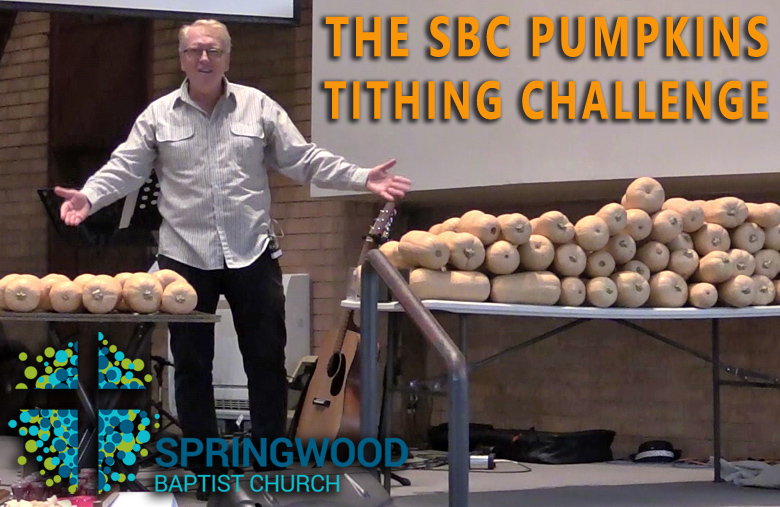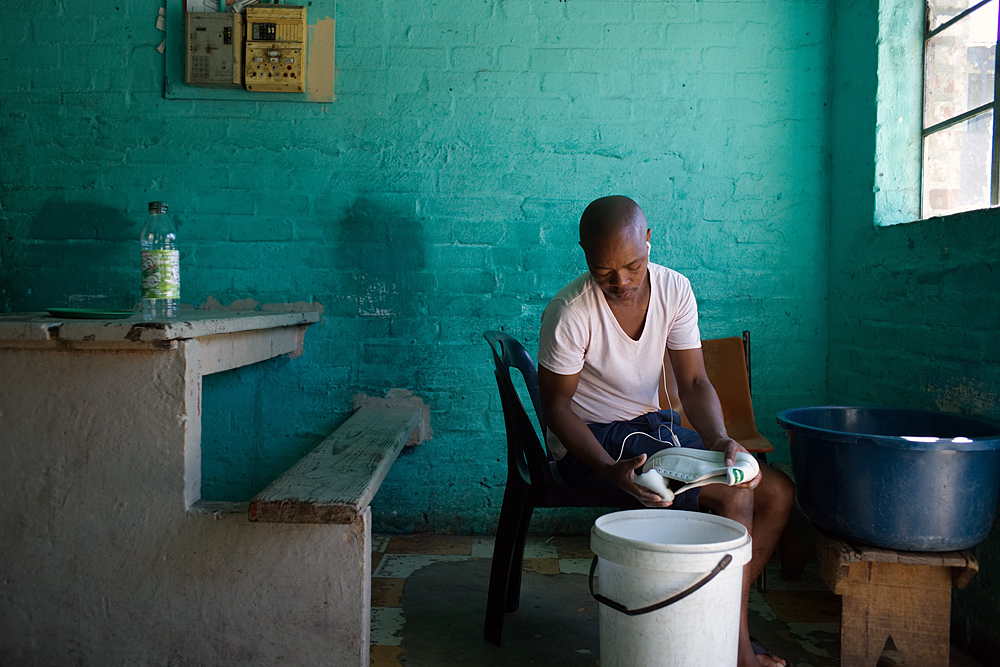Try the SBC Pumpkins Tithing Challenge – And See if You Go Hungry!

Remember this: Whoever sows sparingly will also reap sparingly, and whoever sows generously will also reap generously. 2 Corinthians 9:6
It's fun! It's a challenge! And it will bring your spiritual walk with God alive... I encourage you to do it in every possible, imaginable way. Try the SBC Pumpkins Tithing Challenge — and see if you go hungry.
Perhaps one of the reasons why the early church exploded was they actually took at face value this incredible concept of generosity. "And when this became known, the people glorified the Christian God" - Eusebius.
Senior Pastor Rev. Phil Waugh, of Springwood Baptist Church, NSW Australia, presents us with the SBC Pumpkins Challenge as a practical way to live as disciples of Jesus.
Towards the end of this web page are the Bible readings and other links that go with the SBC Pumpkins Tithing Challenge, and the video, and the sermon.
Does Your Life Lack the Excitement of the Kingdom of God?
Here's a practical way to bring it back:
The SBC Pumpkins Challenge
Here's the steps of the SBC Pumpkins Tithing Challenge:
- Watch the video, which clearly shows the pumpkins and explains their role in your challenge ahead, over the next month.
- Have a think about it.
- Calculate 1% of your income for a month.
- Think about what you could use that for, to further God's Kingdom and to help others in need on this Earth.
- Deduct that much money from your income for the month (adding the new 1% extra to any current tithing/donating you may do already), and give it away.
- Test God (this is a challenge, remember). See if you go hungry.
The Challenge, Level Two
If you made it through level one — and you haven't died from starvation, been evicted from your place of residence, become homeless, or gone bankrupt — you can "level up". And you now qualify to attempt Level Two of the SBC Pumpkins Tithing Challenge:
- Calculate 2% of your income for the month.
- Add that on to your existing amount from Level 1.
- Give that also away to charity.
- See once again how well you can manage on what's left after that for your monthly budgeting.
The Challenge, Level Three
Unlike the Old Testament, there's no fixed amount given for Christians in the New Testament. Many people still consider the Old Testament mandate of 10% as a good idea for a rough guide. But as a Christian you're free to determine for yourself — through prayer, thought, and the logistics of your own situation — what's the highest level you can attain in this challenge...?
Why Is This So Hard?
This is a real challenge for many people. I don't mean a psychological challenge, like they are stingy, or something. I mean a lot of people don't have any money left at the end of the month, or fortnight, or week. And can't imagine how they could give any of that which they don't have to charity.
Yet, most of the people reading this web page are living in one of the richest countries in the world. I heard once that an Australian pensioner with no other income is in the top 10% of the world's richest people based on income.
This seems to be a paradox. How can we be so rich, and so poor — both at the same time?
I think the answer is actually quite simple. At least simple to understand — perhaps not always as simple to implement. The answer is that we buy a whole huge massive amount of stuff that we don't really need. I do this. I do it all the time. I say I'm not going to do it anymore... and then I do it some more. It really is hard to not do this.
Especially, it's hard when we spend a lot of our time immersed in the culture of the world — the media, the entertainment, the expectations... Just watching how other ordinary people live is bad enough (in terms of feeling like we need a lot of material wealth to keep up with them), but then we also spend countless hours watching the lives of the rich and famous in the media. And all the advertising. And the "reality" TV shows where everyone gets a new kitchen, or a whole newly renovated house, or cooks perfect five-star celebrity-quality food in a perfectly opulent five-star celebrity-quality kitchen. And then we think that's normal. And that there's something wrong with us, and something missing from our lives, if we don't have these things.
Ways Around This Difficulty
If this is something you feel you'd like to be more of a part of yourself, here's a few ideas that can help with making it easier:
Pay God First
If you give away some amount that you've pre-determined as soon as you get paid (like from your job, or investments, or pension, or business...), then it's like you never even had that money. This eliminates the problem of getting to the end of the fortnight and there's no money left for God's kingdom. If you pay God first, there may be less money left for other things, but that's an entirely different issue.

Modern banking technology, including regularly scheduled payments, can help maintain regular donations. Unlike the world, Jesus can teach us incredible ways to decresase our revenue while maintaining satisfaction. Photo by Austin Distel on Unsplash.
Make Use of Automatic Payment Technology
Most people now have some sort of online banking. You can use this to set up regular payments, of any amount, at any interval (e.g. once a week, or fortnight, or month, etc.). If you set up something like this to make payments to charity immediately after your regular income goes into your bank account, that can help a lot with the problem of running out of money for giving. It's a fully automatic way to pay God first.
The Light Bulb Has Got to Want to Change
There's a joke that asks, "How many psychotherapists does it take to change a light bulb?" And the answer is: Only one — but the light bulb has got to want to change.
Meaning that giving has to be something that you want to do. Otherwise it's not even giving, really — not in God's eyes and not even in reality at all, in a sense. If you have to do something because you're forced to do it, that's not an act of charity. It's not a gift. It's just another expense like paying the electricity bill.
Get Involved in Christ's Work in this World
This can be either real, physical involvement — or it can just be from a distance, like reading and watching videos. Perhaps just talking to people about it. But spending more time thinking about what you could do with your money to further God's kingdom, to do God's work, to help other people in need. Think about how they will benefit. Think about their happiness and their relief and their joy.

A few of our dollars can make a huge difference to the real lives of real people. Photo by billy cedeno from Pixabay.
This feeling — that you have created some happiness for someone else — can potentially bring you a lot more happiness than some inanimate material object like the most expensive new [insert any material item you admire here].
You can read and watch videos online that can inspire you with this. The fact that we are so rich in modern Western countries, compared to most of the world, makes this really easy once you start to get the hang of it... And start to develop the habit of thinking along these lines.
You can read about how the same amount of money that could buy you a slightly better looking set of floor tiles could instead save an entire person's life from sexual slavery, and free them — just for example. Or, how not that much money at all (by Australian standards) can bring massive help to people with dire survival pressures just because of refusing to deny their faith in Jesus Christ. And there are countless other examples of how you can really do a lot with such a little.
And the good thing about this is that it does feel like you're doing a lot. When, on the other hand, you cave in to the commercial advertising and worldly influences for the latest and most expensive consumer item — only to feel that it's not even the one you really want (which would cost even more than the one you can afford).
Also you can think about how these are real people. And think about the real, substantial, significant improvement of life (in both this world and the next world) that comparatively little Australian (or US, etc.) dollars can give them. Compare this to something like the score in a video game which many people spend many hours working towards, yet this score does not achieve any real-life benefit to anyone outside of the imaginary world of a game/entertainment. The fact that charitable giving creates a real benefit, and brings real happiness, in the real world, in real life, is something you can think about — and it can increase your own feelings of satisfaction (and success) with life, and increase your level of happiness.
To sum this up, seeking after the limitless material riches of a rich and opulent society only makes us feel like we need even more of those riches — and, living this way, most of us never get to the place where it feels like we have enough money.
And the opposite is also true — "losing your life to find it" in this context (of giving for God's kingdom), if done with the right attitude of mind, makes you less worried about not having enough money — instead, it makes you feel like you have more money, and are more secure financially. The right attitude of mind here is that you're giving a gift. A "gift" is something which is optional. Because it's optional, that proves you have more than enough just to be able to give that gift away to someone else. Every time you can succeed in doing that, you prove without doubt that (at least in that moment) you do in fact have more than enough.
The more you do that, the more you'll start to feel overall like you actually do have more than enough.

Thinking more globally, and outside the box of Western media and the entertainment industry, nearly everyone rich enough to be reading this web page has more than enough — comparatively speaking. When I'm less concerned about "needing" more material wealth myself, it's easier to focus on the happiness of feeling close to Jesus. Photo by WikiImages from Pixabay.
Plus there are many other benefits, like learning to trust that God will provide for you. And learning that what God does provide for you is the right thing for you.
These benefits, and more, can be yours if you take the SBC Pumpkins Tithing Challenge.
Watch the Pumpkins Again!
I find that it helps to remind me of the ratios that are really involved here if I watch over again the part of the video showing the large pile of pumpkins, representing what I'm keeping for my worldly life — compared to the smaller pile that I'm using for Christ, who has saved me.
The Challenge, Grandmaster Level: How About Giving 30%?
The video of Phil's sermon includes a story of an old-age pensioner who gives 30% of her income to charity. And has been for years. She said, "I'm giving away 30% of my income — and my testimony is I've never wanted for anything". Giving away 30% of her income. Thirty percent of her income. And she had never been short of money.
That level of giving (and especially without going short yourself) might seem completely incomprehensible to many people. I don't know of many people who give that much (and definitely not myself, at least not so far).
But I did know one. For ten years, I lived with my Great Aunt Pattie. And she did not earn much either. Her total income in the late 1990s was around $20,000 Australian dollars a year. That's roughly equal to what the pension is now. In those days it was worth a little more than the pension (due to inflation) — but it still was not a lot of money by any comparison of modern Australian standards of living. Especially not for someone who lived in the expensive Northern Beaches area of Sydney.
Pat gave away about 1/3 of her income to charity. That's basically 30%. Perhaps a little more even. I don't remember the exact numbers, I remembered it as about one-third. She never talked about it with anyone — not even me — and the only reason I even know about it is that I did her tax returns. For I was once a sinner and a tax collector (and I formally learned how to do tax returns). Now, I'm just a sinner, under the grace of Christ.
And she too was never short of money. In fact, Pat was one of the happiest and most content people I've ever known in my whole entire life. Not only that, but Pat's gradual, subtle, and yet massively positive influence on me is a large part of why I eventually wanted to become a Christian myself.

If you imagine this level of wealth as normal — since on a world scale, it is — it's a lot easier to feel relaxed about your car or your carpet being a few years old. Photo by Frederik Schweiger. Capetown, South Africa.
2 Corinthians 8:1-12
This was the Bible reading for the full-length audio-only version of this sermon, which is titled "Giving and Generosity":
The Collection for the Lord’s People
And now, brothers and sisters, we want you to know about the grace that God has given the Macedonian churches. In the midst of a very severe trial, their overflowing joy and their extreme poverty welled up in rich generosity. For I testify that they gave as much as they were able, and even beyond their ability. Entirely on their own, they urgently pleaded with us for the privilege of sharing in this service to the Lord’s people. And they exceeded our expectations: They gave themselves first of all to the Lord, and then by the will of God also to us. So we urged Titus, just as he had earlier made a beginning, to bring also to completion this act of grace on your part. But since you excel in everything — in faith, in speech, in knowledge, in complete earnestness and in the love we have kindled in you — see that you also excel in this grace of giving.
I am not commanding you, but I want to test the sincerity of your love by comparing it with the earnestness of others. For you know the grace of our Lord Jesus Christ, that though he was rich, yet for your sake he became poor, so that you through his poverty might become rich.
And here is my judgment about what is best for you in this matter. Last year you were the first not only to give but also to have the desire to do so. Now finish the work, so that your eager willingness to do it may be matched by your completion of it, according to your means. For if the willingness is there, the gift is acceptable according to what one has, not according to what one does not have.
2 Corinthians 9:6-15
This passage, again by the Apostle Paul, is also referred to in the sermon and the video:
Generosity Encouraged
Remember this: Whoever sows sparingly will also reap sparingly, and whoever sows generously will also reap generously. Each of you should give what you have decided in your heart to give, not reluctantly or under compulsion, for God loves a cheerful giver. And God is able to bless you abundantly, so that in all things at all times, having all that you need, you will abound in every good work. As it is written:
“They have freely scattered their gifts to the poor; their righteousness endures forever.”
Now he who supplies seed to the sower and bread for food will also supply and increase your store of seed and will enlarge the harvest of your righteousness. You will be enriched in every way so that you can be generous on every occasion, and through us your generosity will result in thanksgiving to God.
This service that you perform is not only supplying the needs of the Lord’s people but is also overflowing in many expressions of thanks to God. Because of the service by which you have proved yourselves, others will praise God for the obedience that accompanies your confession of the gospel of Christ, and for your generosity in sharing with them and with everyone else. And in their prayers for you their hearts will go out to you, because of the surpassing grace God has given you. Thanks be to God for his indescribable gift!

If you imagine yourself and your family living in a war zone, or some other situation of relative poverty (like most of the world's people), it's easier to feel thankful for the amazing wealth we have here than if you compare yourself to people in the media, or even to people from ordinary, worldly modern Western society. It's also easier to be aware of how much power you have to help improve the world. Photo by mohamed Hassan from Pixabay.
The National Church Life Survey (NCLS) data on giving can be seen here, or here for a PDF version.
The full sermon (36m:48s, audio only) can be played and/or downloaded from the link below. It's the one on the 7th of July, 2019, titled "Giving and Generosity".
https://www.springwoodbaptist.org.au/sermons/disciplines-of-discipleship/







